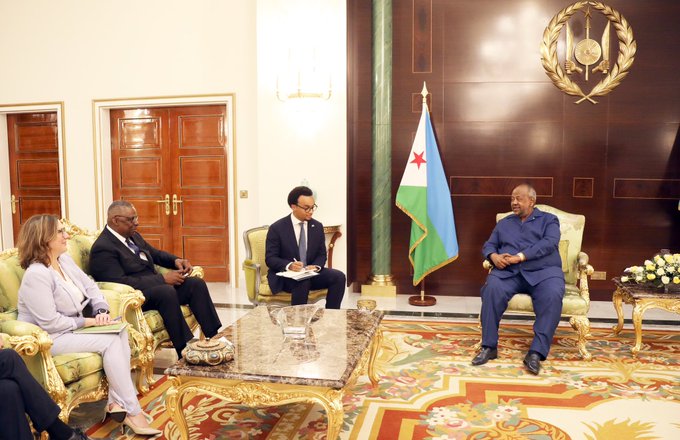Between 24-27 September, the US Secretary of Defense Lloyd Austin, completed his first tour of Africa, during which he visited Djibouti, Kenya, and Angola. The tour gained special significance as East African states grow increasingly fearful of escalating terrorism by Al Shabaab. As the Somali military struggles to uproot the movement from its strongholds, the African Union is gradually pulling out the African Transition Mission in Somalia (ATMIS) according to schedule by the end of 2024.
Meanwhile, several international forces, such as Russia, are seeking to strengthen their presence on the African continent. Therefore, Austin’s tour was primarily aimed at underscoring US military presence in Djibouti and the region, strengthening security and military partnership with allied states, as well as providing assurance that the war on terrorism remains a priority for Washington.
Several Objectives
US Secretary of Defense Lloyd Austin’s African tour pursued several objectives, most notably:
- Affirming US presence: Austin paid a special visit to US troops at the base of Lemonnier, Djibouti, and addressed a small formation of soldiers, pilots, and marines operating outside the base, stating that, “the work you are doing with Djibouti and other allies here is important”. He also thanked the American forces for their “impressive” role in the evacuation of American diplomats from Sudan in April 2023 when conflict between the Sudanese army and the Rapid Support Forces (RSF) escalated.
The Sudanese crisis revealed the importance of the role of this American base, with Washington declaring it was wise in “in planning various emergencies” and “deploying additional capabilities nearby in the region”, with the aim of “securing and facilitating the departure of US Embassy personnel from Sudan”.
Furthermore, observers have pointed out that Austin’s African tour succeeded the military visits by Russian delegations to several countries on the continent (most notably to Libya last August), to assess opportunities for constructing Russian operations in those areas. Austin’s visits therefore appear to counter balance Russian military movements on the continent.
- Strengthening security and military partnership: Austin began his tour of Djibouti, the main US military base on the African continent, referring to the strategic importance of the US partnership with the country. During his visit he met during with President Ismail Omar Guelleh and Defense Minister Hassan Omar Mohamed Burhan to discuss the two countries’ security partnership and common priorities in the region.
Last August, US interest in improving relations with Djibouti was clearly confirmed by Austin’s phone call with President Omar Jilleh, when he praised Djibouti’s “critical role in enabling the safe evacuation of American employees from Sudan last April.”
- Continued engagement in counter-terrorism efforts: This African tour sends a direct message that the fight against terrorism remains at the top of the US agenda. This was evident in the meeting attended by the US Secretary of Defense and Somali President Hassan Sheikh Mahmoud, to discuss joint efforts to counter the Al-Shabaab in the region. President Hassan Sheikh Mahmoud has asserted that he needs “more time” in due to the challenges of “maintaining pressure on the movement” and simultaneously “mobilizing forces effectively”.
During his visit to Kenya, Austin stressed the importance of supporting regional counter-terrorism efforts, stating, “We know that progress is not always a straight line, so we may see things improve one day, and challenges the next.”
These statements came a few days after the Somali Government requested in a letter addressed to the UN that the withdrawal of ATMIS be postponed for 90 days in view of the challenges facing Somali military operations in eliminating Al-Shabaab.
Potential implications
It can be said that this tour and subsequent US developments in the region across different spheres, may have several implications, namely:
- Escalating competition with Moscow: Austin ended his tour in Angola, becoming the first U.S. Secretary of Defense ever to visit the country. With Washington competing with Moscow over arms exports and supplies, Austin remarked, “…Africa deserves better than autocrats who sell cheap arms, support mercenary groups like the Wagner Group, or starve populations around the world for grain.”
- Increasing polarization: Austin’s African tour is inseparable from increasing polarization within the African continent, owing to the tendency of international powers to try to strengthen their influence. For instance, Russia has tried to exploit the recent coups d ‘état in West Africa to up its power against the waning presence of France and other forces.
It is therefore notable that in his visit to Angola, Austin made sure to criticize African military councils formed following coups d ‘état in countries such as Niger, Gabon, Burkina Faso and Mali. In reference to the military regimes that tended to strengthen their relations with Russia, Austin remarked that “…armies are there to defend their people, not to challenge them. Africa needs armies that serve its citizens, not the other way around. “
- Expansion of security and military cooperation: The tour revealed US interests in expanding military cooperation with Djibouti as well as other allied countries in the region. Indeed, on September 25, Austin signed a five-year defence cooperation agreement with his Kenyan counterpart Aden Duale, and pledged USD100 million to support Kenya as it prepares to lead a multinational peacekeeping mission to combat guerilla violence in Haiti.
Containing Threats
Finally, it can be said that Austin’s African Tour was primarily aimed at affirming that the US will remain significantly present on the African scene despite its in dealing with other international crises. Whether because of escalating power struggles or continued terrorist activity by ISIS, Al Qaeda, and others, American interests on the global scene are inseparable from its interests on the African continent.


